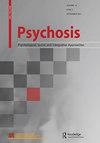"应对声音"小组的准对照试验结果。第2部分
IF 1
4区 医学
Q4 PSYCHIATRY
Psychosis-Psychological Social and Integrative Approaches
Pub Date : 2021-08-27
DOI:10.1080/17522439.2021.1957993
引用次数: 2
摘要
摘要背景这是两篇论文中的第二篇,研究了一项名为“应对声音”的小组项目的有效性。第一篇论文报告了小组主持人执行该项目的经验。第二篇论文报告了参与者的研究结果。方法在61名知情同意参与研究的参与者中,19人没有参加一个小组,因此这提供了一个自然的准对照组。这项研究比较了参加一个小组的42名参与者在小学前和小学后的测量结果。29名与会者还提供了定性数据。对所有61名参与者进行了纵向测量。将参加该项目的个人与没有参加的个人进行比较。结果在参加《应对声音》的42名听力者中,可量化的数据显示,他们对声音的负面信念、声音的严重程度、对声音的痛苦和对声音力量的感知显著降低。参与者的反馈绝大多数都是积极的。次要指标显示,在12个月的随访中,团体参与者与非参与者相比,住院人数显著减少,基本生活技能有所提高。讨论总体而言,这些发现表明“应对声音”是可行的、可接受的和值得的。本文章由计算机程序翻译,如有差异,请以英文原文为准。
Results from a quasi-controlled trial of a “Coping with Voices” group. Part 2
ABSTRACT Background This is the second of two papers that investigated the effectiveness of a group-based program known as ‘Coping with Voices’. The first paper reported on the group facilitators experience of delivering the program. This second paper reports the findings from the participants. Method Of the 61 participants that gave informed consent to participate in the study 19 did not attend a group, so this provided a natural quasi-control group. The study compared pre and post primary measures for the 42 participants who attended a group. 29 group attendees also provided qualitative data. Secondary measures were measured longitudinally for all 61 participants. Individuals who participated in the program were compared to those individuals who did not. Results For the 42 voice hearers who attended Coping with Voices, the quantifiable data showed a significant reduction in negative beliefs about voices, voice severity, distress about voices and the perceived power of the voices. Participant feedback was overwhelmingly positive. The secondary measures show a significant reduction in the number of hospital admissions and an improvement in basis life skills for group attendees versus non-attendees at 12 months follow up. Discussion Overall, these findings suggest ‘Coping with Voices’ is feasible, acceptable and worthwhile.
求助全文
通过发布文献求助,成功后即可免费获取论文全文。
去求助
来源期刊
CiteScore
2.20
自引率
8.30%
发文量
36

 求助内容:
求助内容: 应助结果提醒方式:
应助结果提醒方式:


